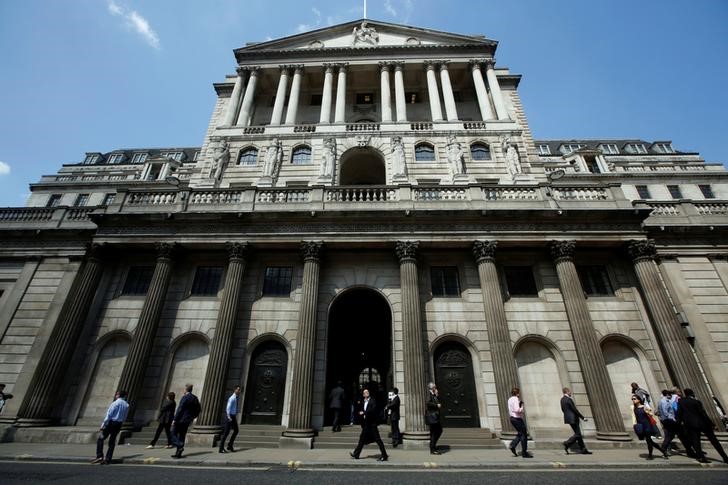By David Milliken and Huw Jones
LONDON (Reuters) - British banks have underestimated the risks from a surge in consumer borrowing and need to hold an extra 10 billion pounds of capital to guard against future dangers, the Bank of England said on Monday.
Unsecured consumer lending is growing at nearly 10 percent a year, far faster than incomes, and the BoE said the low rate of defaults at present had more to do with strong employment growth than prudent long-term lending.
Last month the BoE forecast the economy would slow next year, partly due to Britain's looming departure from the European Union, and earlier this month it said it was likely to start raising interest rates in the coming months.
"Lenders overall are placing too much weight on the recent performance of consumer lending in benign conditions as an indicator of underlying credit quality. As a result, they have been underestimating the losses they could incur in a downturn," the BoE said in a statement.
If there was a sharp downturn that pushed unemployment up to 9.5 percent - more than double its current rate - and caused the Bank of England to raise rates to 4 percent from a current 0.25 percent, British lenders could face 30 billion pounds in losses.
On average, 20 percent of consumer loans would need to be written off over a three-year period, compared with a 2 percent write-off rate at present, the BoE said.
Last year, the BoE only estimated a 13 percent write-off rate, based on a scenario which did not include a big increase in interest rates as well as a different make-up of lending.
Monday's warning is part of a fuller assessment of bank risks which the BoE will publish on Nov. 28. After that, it will tell banks how much extra capital they need to hold based on the individual riskiness of their lending.
For example, credit card lending has an expected write-off rate of 25 percent in a crisis, while car finance would only see a 10 percent loss, even if second-hand car prices fall as well.
The extra 10 billion pounds is small in the context of the 280 billion pounds of core capital held by British lenders, but the BoE said it expected banks to take the greater risks into account in their future lending plans.
INCREMENTAL?
J.P. Morgan economist Allan Monks said Monday's announcement represented an "incrementalist" approach from the BoE's Financial Policy Committee, as it stopped short of placing direct curbs on consumer lending.
By contrast, in 2014 the BoE limited lenders' ability to issue mortgages that were worth more than 4.5 times a borrower's income, and a separate regulator has tightened affordability checks further.
"More direct intervention in the consumer loan market is unlikely unless banks fail to comply with the BoE’s requirements," Monks said.
Unsecured consumer lending is only an eighth of the size of mortgage lending, and does not play a big role in overall consumer spending growth, the BoE said.
But unlike mortgage lending, there is a high risk of defaults during sharp economic downturns.
The BoE said it still intended to raise a separate counter-cyclical risk buffer to 1 percent in November from 0.5 percent.
As well as setting interest rates, the BoE is responsible for financial stability and much regulation, though conduct and consumer protection is mostly the job of a separate body, the Financial Conduct Authority.
Britain's opposition Labour Party proposed capping credit card interest payments in a major speech on Monday.
FCA chief executive Andrew Bailey told Reuters that other measures to help heavily indebted borrowers should be given time to work first.

Separately, the BoE said Brexit posed big legal challenges for about a quarter of derivatives contracts, which businesses use to hedge against interest rate and currency moves, and either new legislation or the redrafting of thousands of contracts would be needed.